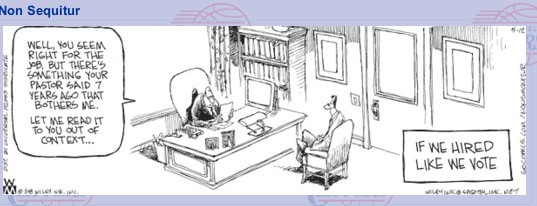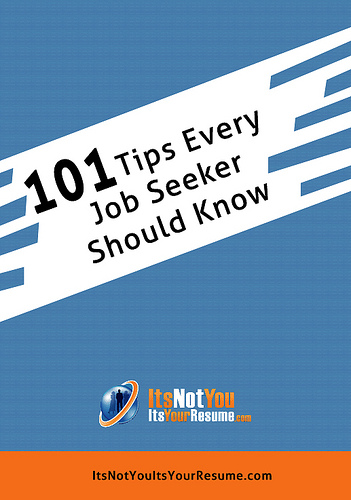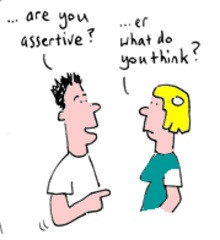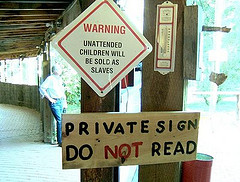As we all know, we are in deep recession and jobs are trying to cut losses by laying people off. Considering their options, they will usually keep employees that they see are a perfect fit for the company. (more…)
Archive for the ‘Referrals/Testimonials’ Category
Helpful Tips You Can Do to Help Stay in Your Job
Thursday, February 24th, 2011You Have More Friends Than You Think: Expand your networking circle with these tips on making friends.
Thursday, February 3rd, 2011Today more than ever, the net rules! Not the Internet. Not by a long shot. I mean your own network. When giving seminars and talks, I like to surprise people with statistics that reveal why sitting behind your monitor actually impedes an effective job search. It’s necessary to some extent, sure. But not the best use of all your time.

A study by the Bureau of Labor Statistics several years back shows that a whopping 48 percent of job seekers secured employment via referrals from friends or relatives. That’s nearly half! And the most I’ve ever heard the Internet yielding is 10 percent. That’s still nothing compared to the power of referral.
So I ask you: Got referral?
Most anyone is a friend
Since you’re born with your relatives and can only expand that niche through marrying or being adopted, the key is making more friends. Webster’s Dictionary defines a friend as “one who is attached to another by affection or esteem; an acquaintance; one who is not hostile.” That last bit of definition really opens it up, doesn’t it? If all those not “hostile” to you are friends, you have a lot of room to play.
We can’t let our high-tech world diminish the eternal need for high-touch career development. Folks, it will never, ever change. Whether technology gives us phone; e-mail; videophone; or surround-sound, handshake-simulation devices, the nuances and human energies that evolve from face-to-face meetings will always prevail in terms of career transition. It simply comes down to meeting people. Meeting them in a memorable way is all the better. If you can be so memorable that you stay top of mind, you’ll lead the pack. And, if you maintain that top-of-mind status through constant contact, you’re home free.
So, let’s talk about networking. What makes someone willing to take the time to meet with you? It’s surely not your need for a job. I’ve said it before, and I’ll sing this song forever: The best way to get a job is not to be looking for one. If you need something that someone might not be able to give you, their natural tendency will be to say “no” to a meeting. That’s why your letter and resume gets shuffled off to HR which places you in the job-seeker vat.
Make friends feel like they will succeed
To combat the vat, you have to approach people in a way that appeals to their natural human nature to be helpful while removing all chance that they won’t succeed. If you need a job, they might not succeed. On the other hand, if you need information, guidance or direction, they will win and maybe get their Good Samaritan ego stroked at the same time.
The second biggest block to people being willing to meet you is time. We all have so little of it, and people working their jobs today are very cautious about time. So, you don’t ask for a lot. A dab will do you. Requesting a five-to-10 minute meeting, face-to-face, in their office to explore a subject you’re researching is enough to get on the radar. With effective personal branding in place and by understanding the human nature of informational interviews, you can make a memorable initial impression. Further, it can be elevated to “friend” status through regular maintenance of that relationship. You never even have to say you’re looking for a job because, when people can help, they do so without your even asking. But you have to get in front of them.
Even more critical than the all-important job you need is the wealth of relationships that can build from the referrals you’ll get to others who can assist in your research. Again, you can’t play this as a game to get a job. People will smell through it. But if you demonstrate a legitimate research effort, you’ll be given names of others to assist in the effort.
Look at it this way. If you have a small music station in the middle of a valley, you’ll be able to broadcast pretty well in the valley. However, if you place more antennas in strategic locations along the mountain ridge, your signal will reach across to the other side. You’ll have a wider broadcast and, therefore, have more song requests coming your way. That’s how you want to develop your career tribe — to get your song out to a wider audience.
| Be sure to look for us on your favorite networks: |
|---|
 |
 |
|---|
| Visit Our Bookstore for Great Values! |
|---|
 101 Tips Every Job Seeker Should Know |
 The Ultimate Online Job Seekers eBook |
 10 Biggest Interview Mistakes |
 10 Biggest Resume Mistakes |
|---|
| Check out these hot articles! |
|---|
Know the ins-and-outs of job references
Tuesday, August 24th, 2010Before providing references and their contact information, be sure to call each person directly to confirm that they will still give you a good reference. Tell them about the job you’re interviewing for and why you consider yourself to be a good candidate. That way, your reference can quickly respond to your prospective employer’s request, and provide exactly the right information to help you get the job.
Who should be my references?
Your references must be able to speak to the quality of your professional work. Personal references such as pastors, friends or neighbors are not suitable. The best references are, of course, from recent employers. Here’s the typical order of preference, starting with the most desirable type of reference.
Here is who you should look to give you the testimonial and/or reference:
- Your most recent indirect supervisor.
- Professional peers.
- People who reported to you.
What if I can’t find the people who are best suited to give me a good reference?
If you’ve lost contact with potential references, contact anyone you still know at the company to find out if they can help you. It’s critical that you find a reference to avoid losing a good job offer!
What if my former company doesn’t allow current employees to give references?
One great option here is to contact other people no longer employed by that company, as they’re no longer bound by that company policy. If your direct boss left the company a few months before you did, he/she would still be a good reference and may speak freely about you.
What if my former boss won’t give me a good reference?
If you aren’t sure what your former boss will say, you can call the human resources department and confirm what’s in your official records. Did you officially “resign” or were you “terminated”? It’s very important that you know what’s in your official employment records. You may also engage a professional firm that conducts reference checks to determine what your former employer will say about you.
| Be sure to look for us on your favorite networks: |
|---|
 |
 |
|---|
| Visit Our Bookstore for Great Values! |
|---|
 101 Tips Every Job Seeker Should Know |
 The Ultimate Online Job Seekers eBook |
 10 Biggest Interview Mistakes |
 10 Biggest Resume Mistakes |
|---|
Networking will pay off later
Tuesday, August 3rd, 2010Did you know that historically, between 70% and 80% of new hires are based on a personal connection or a networking referral? This means that job seekers across all industries and functional disciplines should allocate their time and resources to promote existing connections and establish new relationships. This includes relationships with current and former employees not just where they have worked, but where they want to work.
Following our recommended proactive networking strategy puts prospective candidates in touch with appropriate inside leads before positions are advertised to outsiders. This offers a distinct advantage in the modern world of mass resume submissions and voluminous applications for each available opening
|
Click the pic to get a customized solution for your business! |
|---|
So whenever appropriate, do not forget to plant a “seed” that might land you a job some time later. Whether online or offline, make sure that you have a consistent message when communicating to strategic relationships or unadvertised leads. Rely on your specialization statement as an introductionary elevator statement and then go into greater details when prompted.
As you build relationships and networks, know that these people will become ‘career insurance’ at the worst. Should a job or career fall short and you need to make a change, then these individuals will help you to get your next position.
| Be sure to look for us on your favorite networks: |
|---|
 |
 |
|---|
| Visit Our Bookstore for Great Values! |
|---|
 101 Tips Every Job Seeker Should Know |
 The Ultimate Online Job Seekers eBook |
 10 Biggest Interview Mistakes |
 10 Biggest Resume Mistakes |
|---|
| Check out these hot articles! |
|---|
How to Develop All Star Job References
Thursday, February 25th, 2010Every job seeker knows that when applying for a new job, great references are almost as important as a stellar resume. It’s generally the first thing a hiring manager will ask for in an interview, so you’ll have to be prepared.
What’s the best way to develop your references? Can you just write down a few names and contact information of people who’ll say you’re a good employee who won’t run off with the office supplies? Not exactly.
Developing great, usable references does require some work, but it’s not impossible! Here are a few tips to help you create an all-star list of references.
Who Makes the Cut?
When compiling your reference sheet, the first question you should ask yourself is the most logical one: who’s on the list? Your first instinct might be to choose someone in your company with an executive job title or strong name recognition to people outside of the organization. But, the last thing you want is for a recruiter or hiring manager to make a phone call to this higher-up and hear a response like “Joe who?” For this reason, director supervisors and others who have day-to-day knowledge of your work performance make the best references.
Are They Competition?
While your references should be someone you’ve worked closely with, they shouldn’t be someone who could end up being your competition. They need to have strong knowledge of your work performance, but, for this competitive reason, they should be in a different functional line of work.
Ask Permission
You’ve done your investigative work and have your VIP list of strong, knowledgeable references. But, do they want to be on that list? Maybe not. It’s vital that you get the permission of each and every one of your references before handing their contact information to a recruiter or hiring manager. Once they’ve accepted your request, you’ll need to double check their contact information and find out how they’d like to be contacted - via phone or email. Make sure to also ask when they prefer to be contacted, so they aren’t caught off guard when a recruiter calls.
Find References’ References
Recruiters and hiring managers know that anyone you reference is going to say good things about you. Of course, right? You certainly wouldn’t list a reference who would speak poorly of you. This is why hiring professionals often ask most references: “Who, other than you, has direct knowledge of Joe’s work performance? Can you give me their number or email?”
So, be sure to ask each of your references the same question “Who would you recommend as a reference for me?” If they name someone who might not give you a glowing report, take the opportunity to steer them away and suggest an alternate person.
Get it in Writing
What’s even better than email or phone references? Letters of recommendation. Written references will save you the time and energy that organizing phone references requires. Save yourself even more time by saving every “pat on the back” you get from your supervisor or colleagues throughout the years. When it’s time to job search, these saved accolades will prove invaluable.
Proper Presentation
References should only be provided during the interview. Never include them in your resume or send them in with job applications. When you’re called in for an interview, however, it’s best to have the prepared document to present to the hiring manager.
Keep it Professional
Your references should be strictly professional - choose colleagues or peers who have direct knowledge of your work performance. The “character reference” from an executive’s friend or family member generally isn’t very helpful for the hiring manager, so including one is unnecessary.
After you’ve landed your new job, it’s always a great idea to send each reference a thank you note to show that you appreciate their help in getting you there.
Related articles:
The Interview was Awesome. Now What?
Observe Communication Style When Interviewing
Interviewing Strategy – Clues to Uncover Corporate Culture
The Four Most Important Interview Questions
Send a Value-Added Response After the Interview
For extensive job and career books, visit our career resources page.
The internet, being an extremely popular source, makes competition for getting that job highly competitive. Get started with your My Online Career Space and let that prospective employer know you are the primary candidate for them. With your own personalized career space you will rise above the rest of the job seekers on the internet.
At our website we offer:
If you would like to get up-to-date information, join us on Twitter or on Facebook .
To keep this information free, help us with a cup of coffee. Thanks and cheers!
Are You Doing All You Can???
Wednesday, December 30th, 2009 Many people are struggling through a tough job search these days and it’s not likely to get dramatically easier very soon. So as the days, weeks, and months drag on without an offer in hand, I’ve got a tough question to ask you… be honest with yourself…
Many people are struggling through a tough job search these days and it’s not likely to get dramatically easier very soon. So as the days, weeks, and months drag on without an offer in hand, I’ve got a tough question to ask you… be honest with yourself…
Are you doing all you can?
I teach an 8-week course in job transition skills. Each week everyone gives updates on what they did that week. However, as much as each of them know all the things they could be doing… very few actually execute much from week to week. When the job search drags on, it’s very easy to blame the economy, some liability in their job history, discriminatory factors, time of year, or any number of other reasons. Some are legitimate. However, virtually any obstacle can be overcome with enough time, energy, and effort applied to the search each day.
Are you doing all you can?
For every reason someone might give as to why they can’t get a job, someone else with similar circumstances can be found that overcame the challenge and got hired.
Are you doing all you can?
It may seem like a harsh question for someone that is down and discouraged because so far none of their effort has seemed to work. Their heart is in the right place and they have a daily ‘routine’, however, nothing so far has paid off. Isn’t this kicking someone while they’re down?
My hope is that the question prompts people to kick themselves to get up and put in the focus it takes to get a new job in this market. You can’t get a job as easily as you used to during better economic times. It does take different tactics and much more time and effort than it did before.
Are you doing all you can?
Most people have heard the cliche’ that looking for a job is a full-time job. However, very few people treat it that way. Most people at best put in a couple of hours of concentrated effort into their search each day (in this market, surfing the internet for hours looking at job postings is not concentrated effort). In their job, most people have a schedule and expectations to meet. They work diligently throughout the day because they’ve done it enough to just know what they need to do next. Out of that work environment, on their own, they’re left on their own to create a routine and generally have no one setting expectations other than… ‘Get a job!’
Are you doing all you can?
For many people, they don’t do most of the things in their job search that they need to because those tasks are far outside of their comfort zone. Certainly it’s difficult to have to do something day after day that doesn’t come naturally to you. However, before you even begin, you need to decide whether it’s more important to you to operate only within your comfort zone, or to get a job! My guess is that getting a job is a higher priority so you’ll simply need to get over your fears.
Are you doing all you can?
Most people’s job search consists of surfing for relevant (and often irrelevant) job postings, applying into a database, and waiting… hoping… wishing for a call. VERY few ever get one. Networking, following up an application with a phone call, being ‘Pleasantly Persistent’, sending Thank You notes, seeking informational interviews, being prepared with scripts, having an agenda to your calls and meetings, planning your time effectively… are all critical to getting where you want to go faster!
Are you doing all you can?
Many people don’t do what they can because their attitude has taken a beating and their confidence has drained. It’s hard to go after things more aggressively when you’re down on yourself. Doing what ever is necessary to keep your attitude up during a job search is one of the most critical things you can do. Eliminate the things that bring you down!
Are you doing all you can?
Examine your schedule and how you spend your time. Are you focusing your efforts on things that are productive? Do you feel like you gave your best effort at the end of your day or your week? Or is there room for improvement?
Look at yourself in the mirror and be honest with yourself. Adjust your attitude if necessary. Then start fresh. Get out your planner and create a schedule for yourself. Fill up your day just as you would do in your career. Determine what activities deserve the most time. Determine to be the most professional candidate in your field.
Your job search is bound to become more productive and if then, you can look in the mirror and be able to say: ‘I’m doing all I can!’ You will have more confidence and sleep better… it becomes a matter of time.
Author:
Harry Urschel has over 20 years experience as a technology recruiter in Minnesota. He currently operates as e-Executives and writes a blog for Job Seekers called The Wise Job Search.
For more career coaching, check out these articles:
Prep for a surprise interview with quick-but-deep Internet research
How long should you wait for a business appointment?
The 3 Things to Bring to the Negotiating Table
Career Numbers: How Much Does A Bad Resume Cost You
The internet, being an extremely popular source, makes competition for getting that job highly competitive. Get started with your My Online Career Space and let that prospective employer know you are the primary candidate for them. With your own personalized career space you will rise above the rest of the job seekers on the internet.
If you would like to get up-to-date information, join us on Twitter, Digg, StumbleUpon, Facebook and MySpace.
Check Your Credit? Your Employer Will
Thursday, December 17th, 2009  You’ve been between jobs for months, struggling from unemployment check to unemployment check. Your credit cards are maxed out, and your payments are tiptoeing against the deadline every single time. But you have a rocking resume, your interview skills are insanely sharp, and you can tell that last employer is ready to hire you. So how mad would you be to learn you’re about to be turned down for your job as an athletic trainer because two of your loan payments were 15 minutes late? We’re guessing furious. The scenario might seem far-fetched, but it’s exactly the type of thing that could happen to almost half of job applicants in the U.S.
You’ve been between jobs for months, struggling from unemployment check to unemployment check. Your credit cards are maxed out, and your payments are tiptoeing against the deadline every single time. But you have a rocking resume, your interview skills are insanely sharp, and you can tell that last employer is ready to hire you. So how mad would you be to learn you’re about to be turned down for your job as an athletic trainer because two of your loan payments were 15 minutes late? We’re guessing furious. The scenario might seem far-fetched, but it’s exactly the type of thing that could happen to almost half of job applicants in the U.S.
Who Checks This Stuff?
 According to a recent report, 43% of employers consult credit reports of job applicants, an increase from 36% in 2006 and 25% in 1998. And they aren’t just checking on jobs related to handling money—many employers think a bad credit score signifies unreliability in general. You know it’s more of a sign that your lack of a job has hampered your ability to pay bills, but employers don’t always see it that way. Should they? We definitely think so. And logic will tell you that a credit check won’t come until fairly late in the recruiting process—sometimes after you’ve already accepted a position. If you’ve disclosed your social security number, you should be on high alert.
According to a recent report, 43% of employers consult credit reports of job applicants, an increase from 36% in 2006 and 25% in 1998. And they aren’t just checking on jobs related to handling money—many employers think a bad credit score signifies unreliability in general. You know it’s more of a sign that your lack of a job has hampered your ability to pay bills, but employers don’t always see it that way. Should they? We definitely think so. And logic will tell you that a credit check won’t come until fairly late in the recruiting process—sometimes after you’ve already accepted a position. If you’ve disclosed your social security number, you should be on high alert.
Know Your Rights
 An employer who intends to conduct a background check (which may or may not include your credit history) is required to get your signed permission before doing so. They are legally required to obtain this permission on a form completely separate from any other questions—it can’t be on a job application, for instance. But once you’ve signed away that right, they don’t need to ask again. You can read your rights in greater detail here. Technically, an employer is required to tell you if an outside credit report was the deciding factor in taking negative action against you (firing or refusing to hire you). But it’s fairly simple for them to attribute the decision to other factors, and if they conducted the search independently, the Fair Credit Reporting Act doesn’t cover their search at all. Your rights are somewhat limited.
An employer who intends to conduct a background check (which may or may not include your credit history) is required to get your signed permission before doing so. They are legally required to obtain this permission on a form completely separate from any other questions—it can’t be on a job application, for instance. But once you’ve signed away that right, they don’t need to ask again. You can read your rights in greater detail here. Technically, an employer is required to tell you if an outside credit report was the deciding factor in taking negative action against you (firing or refusing to hire you). But it’s fairly simple for them to attribute the decision to other factors, and if they conducted the search independently, the Fair Credit Reporting Act doesn’t cover their search at all. Your rights are somewhat limited.
What Can You Do About It?
 A bill currently in congressional committee, H.R. 3149, would prohibit employers from using applicants’ bad credit checks against them. You can track the progress of that bill here. But if you aren’t willing to rely on Congress to act before your prospective employer does, you might want to take matters into your own hands. The first and most important step is to obtain a copy of your credit report (you can do this for free on an annual basis). Not only will this show you the glitches you might already be concerned about, but it will also show you potential landmines you had nothing to do with. You could be the victim of identity theft or an accidental error on someone else’s credit application. Either way, you need to make sure there’s nothing erroneous. You can dispute errors in your credit report, but what about the legitimate blemishes? Be wary of credit reparation services that offer to erase your mistakes—they’re more likely to take away your money and nothing else. Reputable agencies can help you expedite disputes and clear outdated infractions, but they can’t work magic or break the law. Ultimately, the lesson is to be wise with how you handle your finances. When cash flow is tight, keep the credit cards under wraps as though your next job depended on it—because it very well may, until Congress does something about it. Related posts:
A bill currently in congressional committee, H.R. 3149, would prohibit employers from using applicants’ bad credit checks against them. You can track the progress of that bill here. But if you aren’t willing to rely on Congress to act before your prospective employer does, you might want to take matters into your own hands. The first and most important step is to obtain a copy of your credit report (you can do this for free on an annual basis). Not only will this show you the glitches you might already be concerned about, but it will also show you potential landmines you had nothing to do with. You could be the victim of identity theft or an accidental error on someone else’s credit application. Either way, you need to make sure there’s nothing erroneous. You can dispute errors in your credit report, but what about the legitimate blemishes? Be wary of credit reparation services that offer to erase your mistakes—they’re more likely to take away your money and nothing else. Reputable agencies can help you expedite disputes and clear outdated infractions, but they can’t work magic or break the law. Ultimately, the lesson is to be wise with how you handle your finances. When cash flow is tight, keep the credit cards under wraps as though your next job depended on it—because it very well may, until Congress does something about it. Related posts:
- You Are Hired! Scratch That, We Just Saw Your Credit Report
- Poll : Should Credit Check Be a Part Of The Employment Process?
- Ex-Cons Vs. Bad Credit : Who Would You Hire?
For related articles about personal branding and job search, review these articles: Personal Branding Interview: How Mark Cummata Got a Job Through Twitter What Should You NOT Do At a Networking Event Your Professional Brand Pre-During-Post Interview
The internet, being an extremely popular source, makes competition for getting that job highly competitive. Get started with your My Online Career Space and let that prospective employer know you are the primary candidate for them. With your own personalized career space you will rise above the rest of the job seekers on the internet.
If you would like to get up-to-date information, join us on Twitter, Digg, StumbleUpon, Facebook and MySpace.






![Higher Learning Leads to Higher Earnings, Especially for Men [InfoGraphic] Higher Learning Leads to Higher Earnings, Especially for Men [InfoGraphic]](../../4022/4340939642_374fbff6e3_m.jpg)











